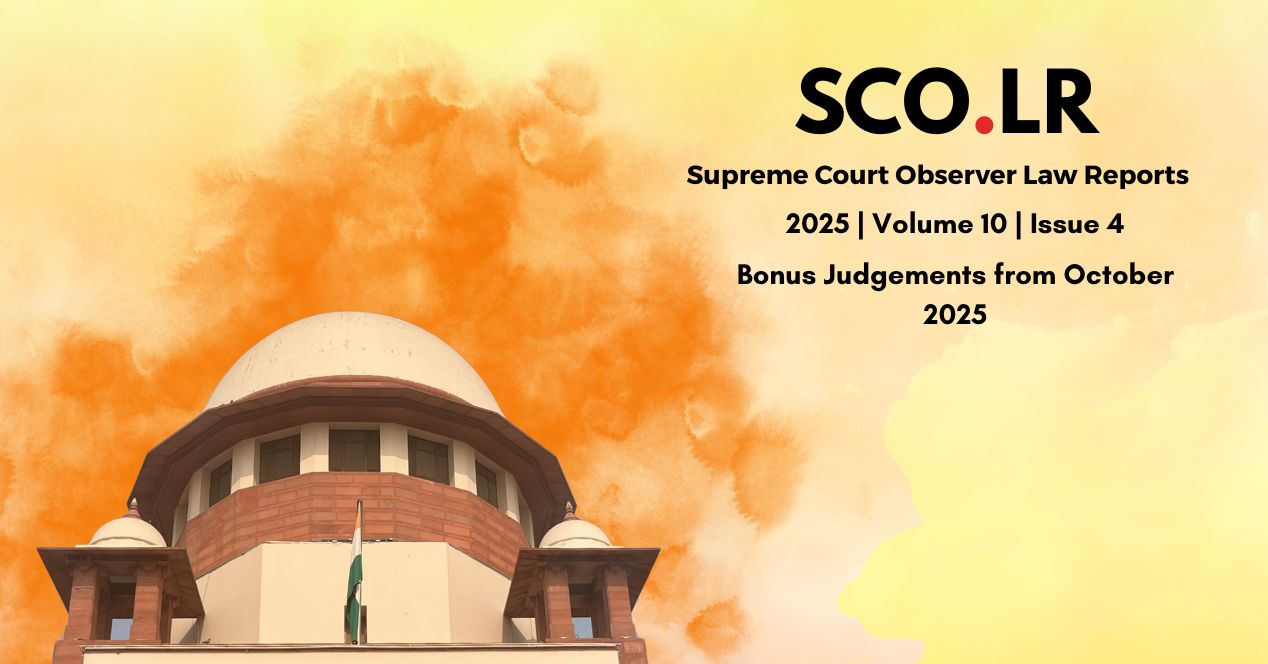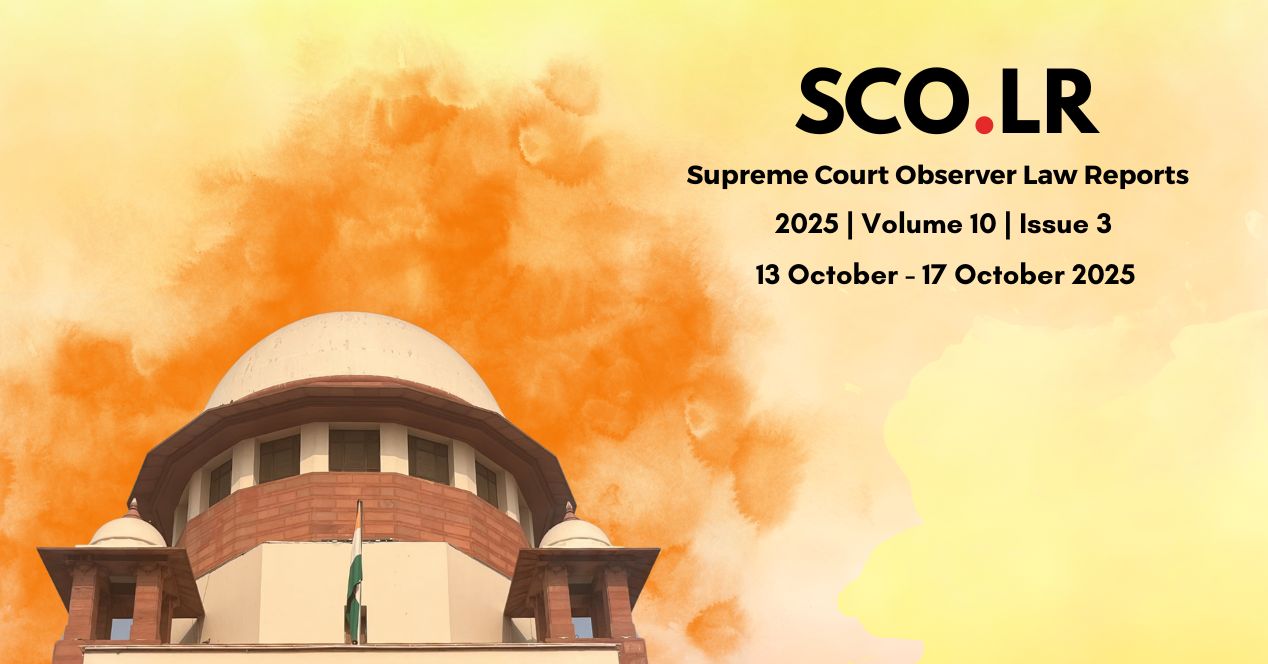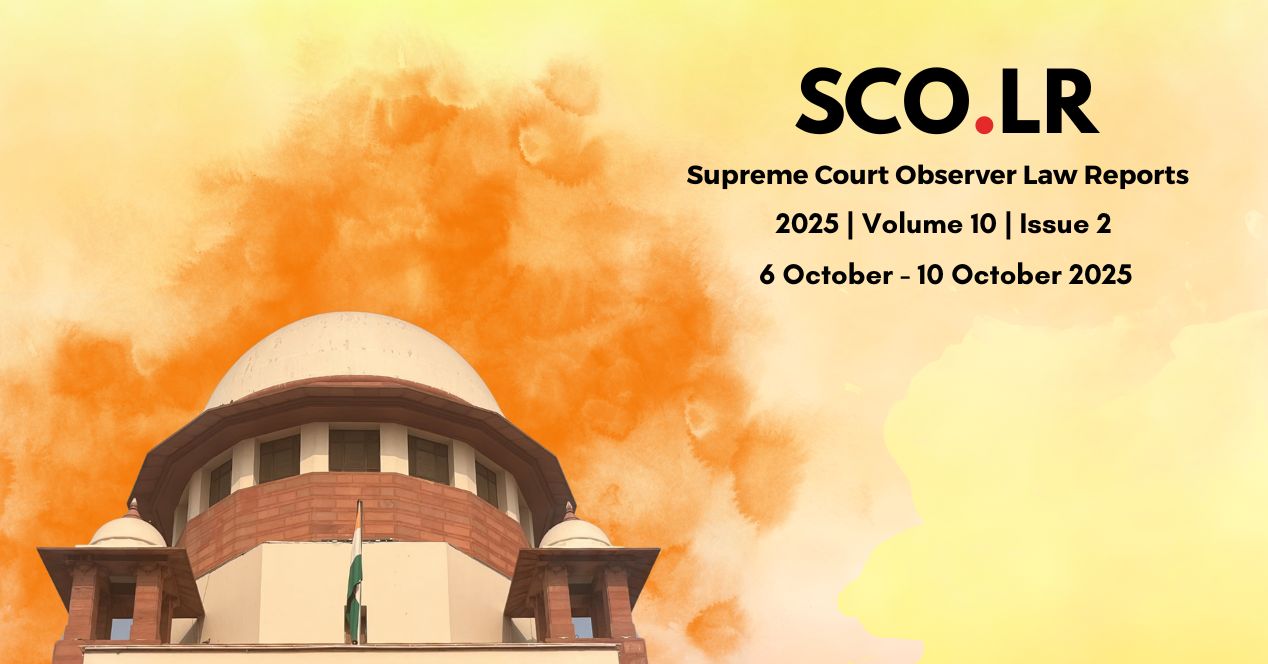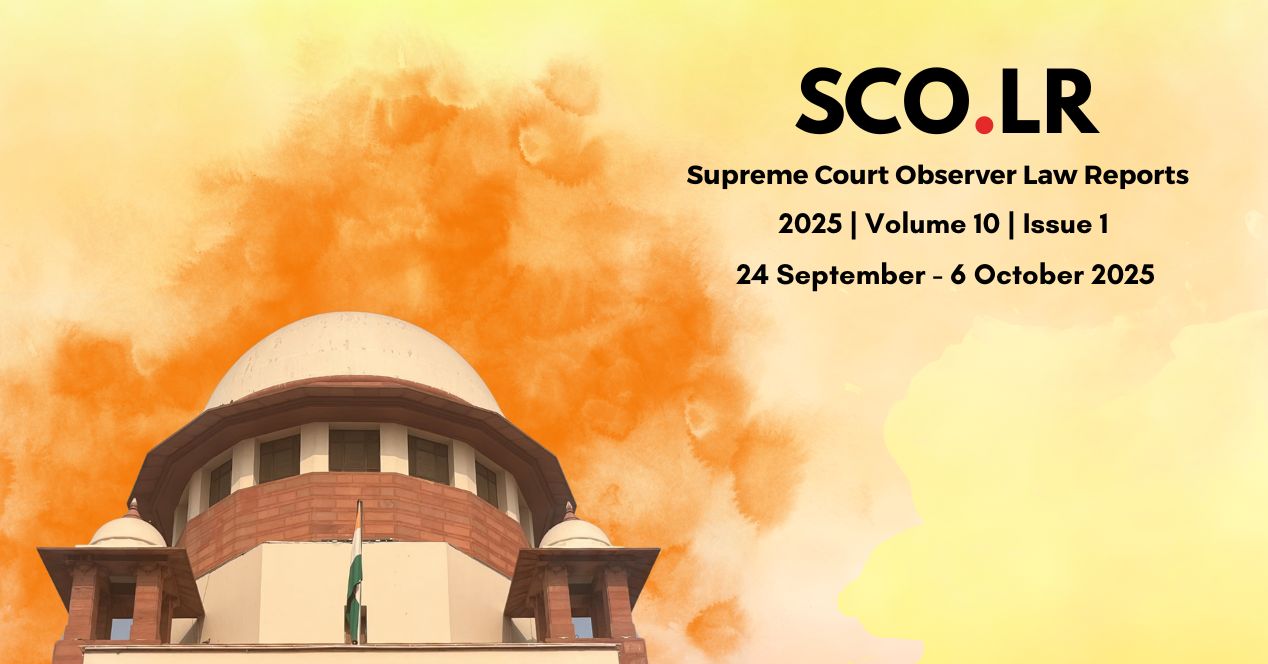Analysis
SCO.LR | 2025 | Volume 11 | Issue 1
In this Issue of SCO.LR, we bring you five important judgements from 27 October to 31 October 2025
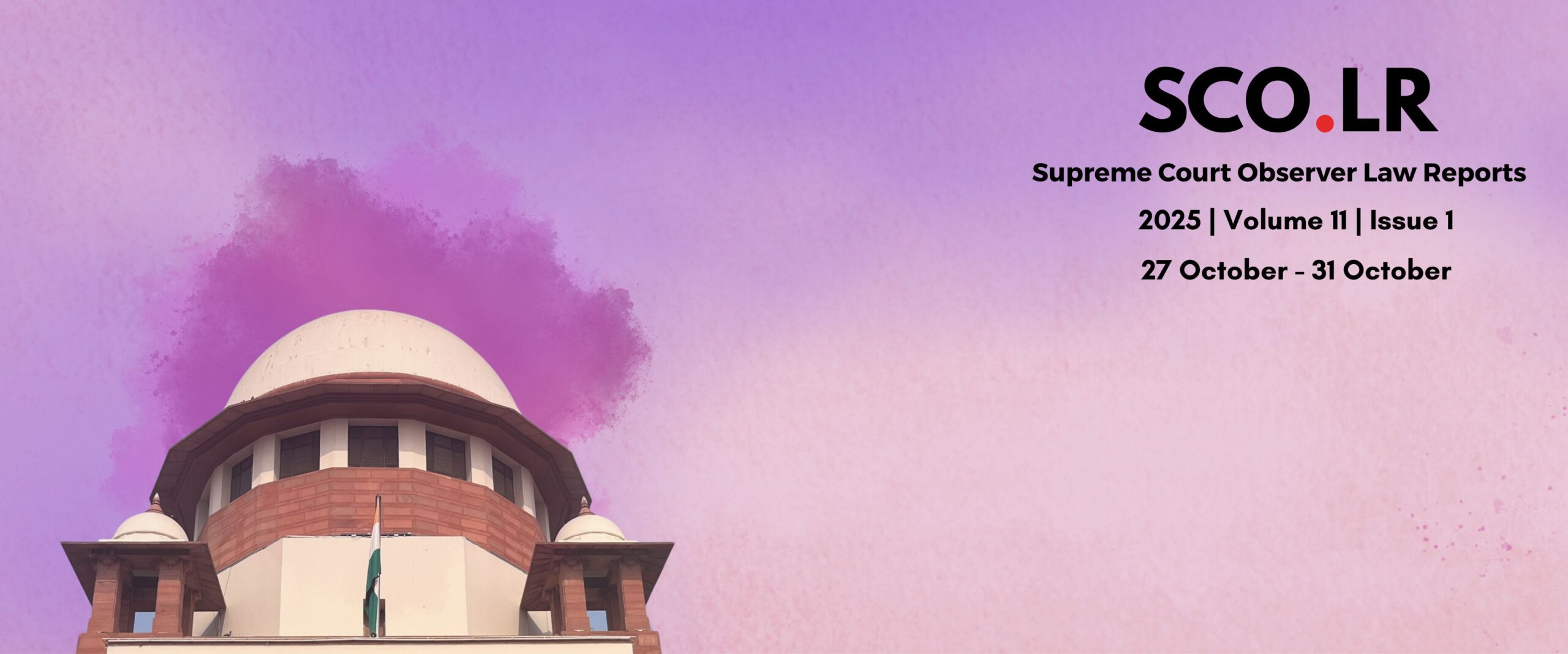
Volume 11 Issue 1 of SCO.LR is here!
As always, SCO.LR judgements are available on an HTML page which makes reading and searching a simple task! SCO offers a feature to link paragraphs directly to your research and assignments. Look out for the 🔗 symbol at the top right corner of every paragraph.
Read this Issue and all other Issues of 2025 on our SCO.LR page.
**********
The Supreme Court Observer Law Reports
SCO.LR | Volume 11 | Issue 1
27 – 31 October 2025
**********
Pre-Litigation Mediation in IP Suits
Novenco Building and Industry v Xero Energy Engineering Solutions
27 October 2025
Citations: 2025 INSC 1256 | 2025 SCO.LR 11(1)[1]
Bench: Justices P.V. Sanjay Kumar and Alok Aradhe
The Supreme Court held that IP suits requiring urgent relief are not required to have a compulsory pre-institution mediation as mandated under Section 12A of the Commercial Courts Act, 2015.. The urgency must be determined from the nature of the relief and the continuing harm caused by the alleged infringement.
The appellant, a Danish manufacturer of industrial fans, alleged that its Indian distributor was using its patented design to manufacture and market identical fans, in breach of their dealership agreement. A Single Judge and a Division Bench of the Himachal Pradesh High Court rejected their petition for non-compliance with Section 12A, holding that the delay of several months before filing the suit negated urgency and made mediation mandatory.
The Supreme Court set aside the High Court’s orders, and held that infringement of intellectual property rights is a wrong that causes recurring harm to goodwill, reputation and consumer trust. The Court noted that the exception for urgent interim relief under Section 12A must be applied pragmatically.
Key words/phrases: Section 12A Commercial Courts Act—pre-institution mediation—urgent interim relief—intellectual property infringement—continuing wrong—delay not fatal—Himachal Pradesh High Court
Read the Judgement here.
**********
Pay and Recover Principle in Insurance
K. Nagendra v The New India Insurance Co. Ltd.
29 October 2025
Citations: 2025 INSC 1270 | 2025 SCO.LR 11(1)[2]
Bench: Justices Sanjay Karol and P.K. Mishra
The Supreme Court applied the ‘pay and recover’ principle while holding that denying compensation to an accident victim on the ground that it fell outside the purview of an insurance policy would be offensive to the sense of justice.
On 7 October 2014, a bus collided with a motorcycle, killing the rider on the spot. The dependents of the deceased filed a claim before the Motor Accident Claims Tribunal. Aggrieved by the amount of compensation, the dependents appealed the order of the Tribunal in the Karnataka High Court. A second appeal was filed by the insurance company, contending that the bus driver had deviated from the route covered by the policy. The High Court directed the insurance company to compensate the victim and recover dues from the driver or owner of the bus.
The Supreme Court upheld the High Court’s verdict. The Court observed that the accident was no fault of the victim and the High Court correctly balanced the needs of the deceased’s family and the interest of the insurance company. At the same time, it noted that insurance policies operate within four corners of a contract and payments to third parties outside the bounds of the agreement are liable to be made good by the party at fault.
Key words/phrases: Pay and recover principle—insurance—accidents—Motor Accident Claims Tribunal—compensation outside the permits of policy—National Insurance Co. Ltd. v Swaran Singh (2004)—interests of insurer—needs of victims.
Read the Judgement here.
**********
Factors to Determine Whether Loss is Caused by Fire
Orion Conmerx Pvt Ltd. v National Insurance Co. Ltd
30 October 2025
Citations: 2025 INSC 1271 | 2025 SCO.LR 11(1)[3]
Bench: Justices Dipankar Datta and Manmohan
The Supreme Court held that a fire intentionally started by another person, without the insured agreeing to it, is to be treated as an accidental fire.
The Preliminary Surveyor attributed fire to a short circuit, while the Final Surveyor concluded it was not accidental. The National Consumer Disputes Redressal Commission assessed the loss at Rs. 61,39,539, and directed the insurance company to pay the amount, along with simple interest at 9 percent per annum from the date of claim repudiation.
On appeal, the Supreme Court found the National Commission’s view of the policy not providing for coverage of FFF (furniture, fixtures and fittings) as incorrect. Therefore, the Court held that the insured party is entitled to the amounts claimed under the heads of Building, Plant and Machinery, Showroom, Electric Fittings, furniture and fixtures. The Court noted that the cause of the fire was immaterial for it to fall within the policy’s ambit, as long as there was no allegation or finding of fraud on the part of the insured.
Key words/phrases: National Consumer Disputes Redressal Commission—fire insurance—fire caused by third person—cause of fire immaterial if insured is not instigator—Surveyor’s conclusion—broad interpretation of coverage provisions—resolve in favour of insured in case of ambiguity
Read the Judgement here.
**********
Extent of Attorney-Client Privilege
31 October 2025
Citations: 2025 INSC 1275 | 2025 SCO.LR 11(1)[4]
Bench: Chief Justice B.R. Gavai, Justices K.V. Chandran and N.V. Anjaria
The Supreme Court held that an investigating officer (IO) cannot directly summon a lawyer to extract details of a case in which their client is involved. The IO can summon under the exceptions of Section 132 of the Bharatiya Sakshya Adhiniyam, 2023 (BSA), which protects professional communications. The Bench held that such protection will not be available for in-house counsel as they do not fall within the definition of an “Advocate” under the Advocates Act, 1961.
A summons was issued to an advocate of the Gujarat High Court under Section 179 of the Bharatiya Nagarik Suraksha Sanhita, 2023. The advocate approached the High Court, which dismissed the petition. On appeal, a Division Bench of the Supreme Court referred two questions to a larger Bench. The Chief Justice of India set up a Bench which heard the case under its suo moto jurisdiction.
The Court set aside the summons notice and held that an IO can only issue a summons within the exceptions, if it is approved by a hierarchical superior. Further, the power to issue such a summon is not an absolute or blanket power. Moreover, the summons will be subject to judicial review. The Bench clarified that its holding will not apply to in-house counsel as they have full-time salaried employment and are likely to be influenced by the commercial and business strategies pursued by their employer.
Key words/phrases: Section 132 of Bharatiya Sakshya Adhiniyam, 2023—advocate-client privilege—Article 20 of the Constitution of India—investigating officer cannot summon Advocate, unless covered under exceptions of Section 132—privilege not extended to in-house counsel—not falling under definition of Advocate under Advocates Act, 1961
Read the Judgement here.

